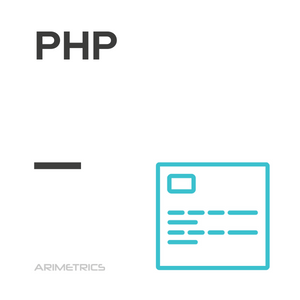Definición:
PHP, which stands for “Hypertext Preprocessor”, is a widely used open source programming language, especially in the development of applications and websites. This language can be embedded in HTML5, which facilitates the connection between the user interface and servers due to its flexibility and adaptability.
Unlike other programming languages such as HTML, CSS or JavaScript, which are processed by the browser when accessing a web page, PHP is executed directly on the server. This means that PHP code is processed on the server before the page is sent to the user’s browser.
What PHP is for
PHP is a versatile language that is used in a wide variety of web applications due to its flexibility, ease of use and ability to integrate with multiple technologies. Some of the most common applications that use PHP are highlighted below:
- Content Management Systems (CMS): In addition to WordPress, PHP is the basis for other popular CMSs such as Joomla and Drupal, which allow users to create and manage web content efficiently.
- Discussion Forums: PHP is used to develop forum platforms such as phpBB and vBulletin, which facilitate the creation of online communities where users can interact and share information.
- E-learning platforms: PHP is used in learning management systems such as Moodle, which allow educational institutions to offer online courses and manage student learning.
- Shopping Carts and E-commerce: Applications such as Magento and OpenCart, which allow businesses to sell products online, are built on PHP and offer advanced functionality for managing product catalogs, payments and shipping.
- Customer Relationship Management (CRM) systems: PHP is used in CRMs such as SuiteCRM, which help companies manage their interactions with customers and optimize their sales processes.
- Social Networking Applications: Some social networking platforms and online community applications also use PHP to handle large volumes of data and users.
Benefits of using PHP
Among the benefits of using PHP are the following:
- Fast navigation: PHP contributes to fast page loading, improving the user experience and favoring search engine positioning.
- Large developer community: A large community of developers is constantly improving and updating the language.
- Ease of use: PHP is considered one of the easiest languages to learn in the programming world.
- Versatility: It can be used on various types of servers and operating systems.
- Compatibility: PHP is easily combined with other programming languages such as HTML, CSS or Java.
- Support for multiple databases: Its ability to work with multiple databases makes it ideal for the development of database-driven web applications.
Disadvantages of PHP
PHP may, however, have some flaws:
- Performance in high load scenarios: PHP can suffer from performance issues in scenarios with high traffic volume and multiple simultaneous requests.
- Security: It can be vulnerable to attacks if strict security practices are not followed. It is crucial to implement preventive measures.
- Code consistency: PHP’s flexibility can lead to inconsistency in coding style in large or collaborative projects.
- Error handling: Although improved, error handling in PHP can be less intuitive than in other modern languages.
- Server dependency: PHP requires a server to execute its code, which requires proper configuration and maintenance of the server environment.

